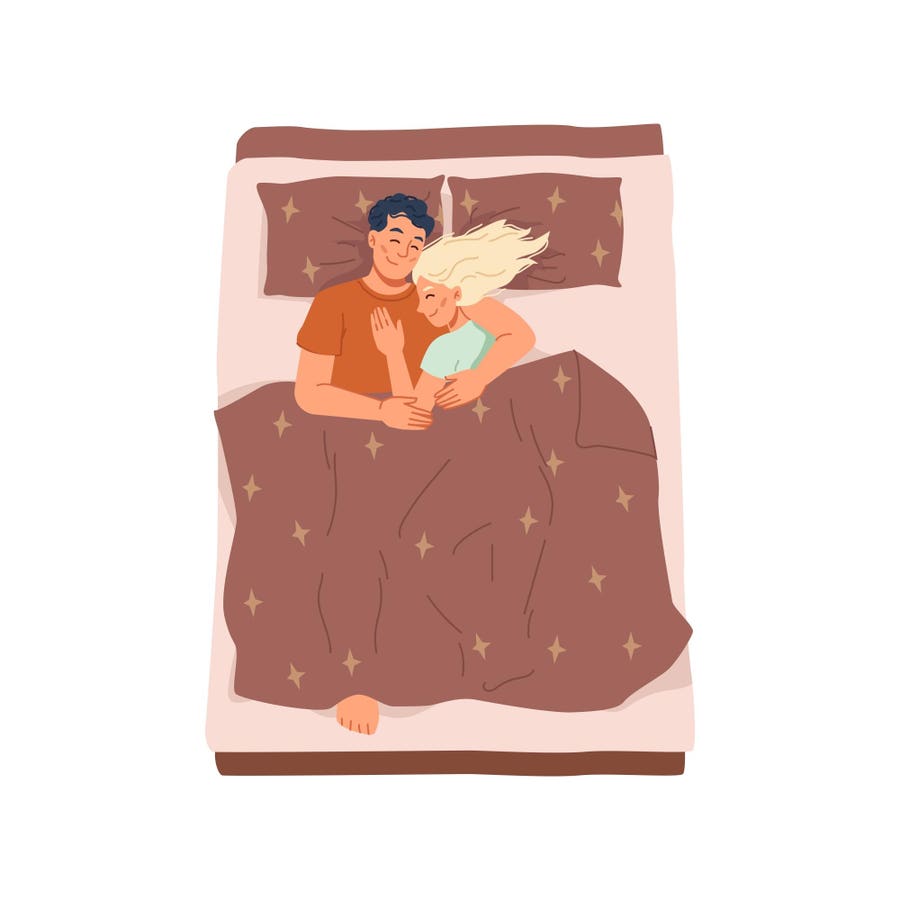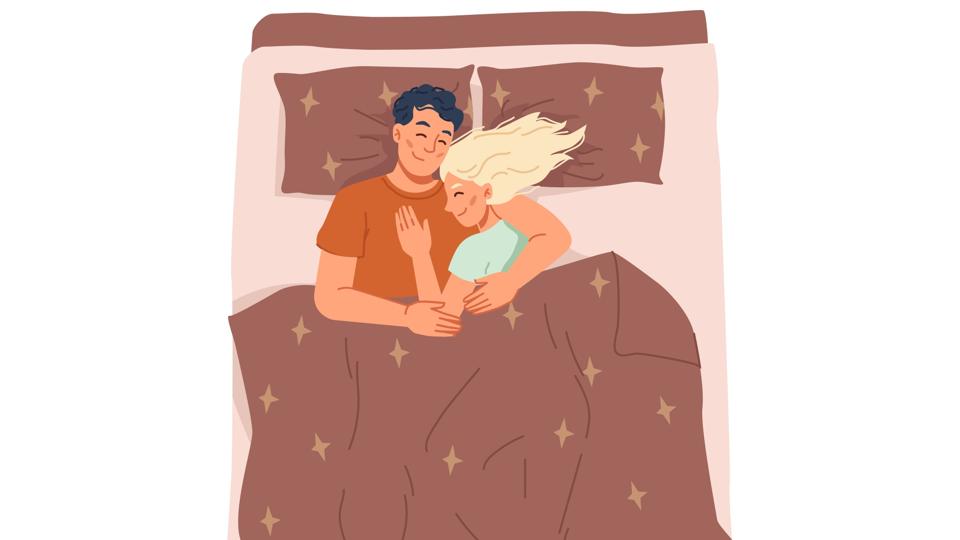Does your partner struggle to stay awake when you’re around? Here’s why, according to research, this means they love you more than you’d think.
getty
Have you ever spent all day eagerly waiting to see your partner, looking forward to all the fun things you’ll do together, only for them to fall asleep the moment you both settle onto the couch? While this might be one of the most universal experiences in a relationship, it’s also one of the most puzzling.
Some individuals might not think much of it; they assume that their partner is just exhausted from a long day, and desperately in need of the rest. Others, who too have been guilty of drifting off themselves, might be even more understanding.
But if you or your partner are often prone to this kind of nodding off, it might start to feel frustrating for the other. One might start to question whether their partner is really as excited about spending time together as they are — or, worse, whether they’ve bored them right to sleep.
But, surprisingly, 2022 research published in Sleep Science hints that none of these explanations truly cover it. Rather, the study suggests that your or your partner’s drowsiness may actually be a hidden sign of their love for you.
Here’s why, according to the research.
The Science Behind Love And Sleep
The authors of the 2022 study set out overarchingly to explore what connection exists between individuals’ sleeping patterns and their romantic relationships. To do so, the research team surveyed nearly 800 adults, all of whom were involved in varying kinds of romantic or sexual relationships. Some were long-term and committed partnerships, others were in more casual relationships, and a few simply had occasional flings.
In addition to the relationship statuses, the researchers also measured various core aspects of the participants’ relationship satisfaction and quality. Specifically, they identified their levels of emotional closeness, sexual activity and sexual satisfaction.
Then, the researchers chose to focus on two of the most critical markers in sleep science. These were sleep latency — referring to the amount of time it takes for an individual to fall asleep — and sleep quality — which entails how restorative and uninterrupted that sleep is.
After comparing the participants’ data, the authors of the study found, unambiguously, that those who reported having steadier and more emotionally satisfying relationships also had much less trouble falling asleep at night.
In addition to their greater sleep latency, they also described having greater sleep quality. They experienced far fewer restless nights and awakenings, and woke up feeling significantly more rested in the mornings than couples in less committed and satisfying relationships.
Why Your Partner Keeps Falling Asleep On You
While the link might not seem immediately clear, the 2022 study’s findings lend some support to the idea that a partner who truly loves you is more likely to doze off in your presence.
As lead author of the study, Madeline Sprajcer, explained in an interview with Newsweek, “We found that perceived partner responsiveness — that is, the extent to which you feel that your partner understands, appreciates, and really cares for you — is a critical predictor of sleep quality.”
Clarifying, Sprajcer went on to explain that, to have the highest quality and most restorative sleep possible, an individual must be in a very certain state of calm. This means that if you have even a lingering trace of anxiety or stress leftover from the day, you’ll still find falling (and staying) asleep to be much more difficult than it should be.
To this end, being in a relationship with someone who consistently makes you feel safe and cared for can be a great way to quiet the cognitive noise that would otherwise keep you awake at night. Sprajcer explains that there are two biological factors at play in this process, in tandem with perceived partner responsiveness: the hormones cortisol and oxytocin.
You could consider cortisol your body’s built-in alarm system: when its levels are high, you’ll feel both restless and on guard. It’s the exact same hormone that spikes when you’re in a stressful situation of any kind, from being stuck in traffic to being caught in a heated argument. Specifically, elevation of your cortisol levels will keep your heart rate and blood pressure higher than it should be.
Of course, this is helpful if you’re running from danger, but awful when you’re trying to drift off to sleep. However, with a loving and attentive partner nearby, your body will immediately start to sense that there aren’t any immediate threats nearby. That is to say, their presence alone can directly contribute to a decrease in your cortisol levels.
As a result, you’ll soon start to feel your shoulders starting to unclench and your thoughts slowing down. This is, essentially, your body giving you physical permission to rest.
And as this cortisol decrease occurs, your oxytocin will likely elevate, too. As its colloquial name (the “love hormone”) aptly suggests, oxytocin is one of the primary neurotransmitters released during intimate moments with others in order to facilitate bonding.
In other words, whenever you’re holding hands, cuddling, having sex or simply close to your partner, you’re likely to experience a surge in oxytocin.
Yet, unlike cortisol, oxytocin will have an effect on your body akin to that of a sedative. Since it slows your breathing, while simultaneously soothing your stress, it gives rise to a natural sense of safety and affection.
Together, these lowered cortisol levels and boosts in oxytocin can activate your parasympathetic nervous system. This activation will further slow your heart rate, deepen your breathing, while also softening your muscles.
Instead of scanning the world for threats like it’s trained to do, you’ll gear into what is often referred to as “rest and digest mode.” Your body will begin to digest your food, repair your cells and “recharge” your energy in this state.
This shift is strongly associated with a deep sense of rest and calm, which, in turn, may lead you to feel sleepier. Spa days or meditation retreats are renowned for this evoking kind of response, but so does, as the 2022 study shows, simply by being near someone whom you love and trust.
To anyone in a committed relationship, these findings likely make sense. There’s nothing quite as soothing as the drowsy calmness that washes over you when your partner runs their hands through your hair. Nor can words effectively describe the inexplicable heaviness of your eyelids during a good cuddle session.
Regardless of whether there’s physical touch involved or not, the mere combination of low cortisol and heightened oxytocin is enough to, quite literally, soothe your nervous system to sleep.
So, as annoying as it might be for your partner to start snoring mid-conversation, the research suggests that you should perhaps start accepting this as a compliment of the highest order.
Their body clearly interprets your presence as an unmistakable signal of safety and security. Your being is a cue for them to let go and stop bracing for the world; instead, they can rest and recharge safely and pleasantly with you around. This is quite far from being a sign of boredom or disinterest. Their sleepiness, in reality, could just be a silent love — signed dearly by their nervous system.
Is your sleepiness a symbol of your love? Take this science-backed test to find out, and see how you compare to others: Relationship Satisfaction Scale









